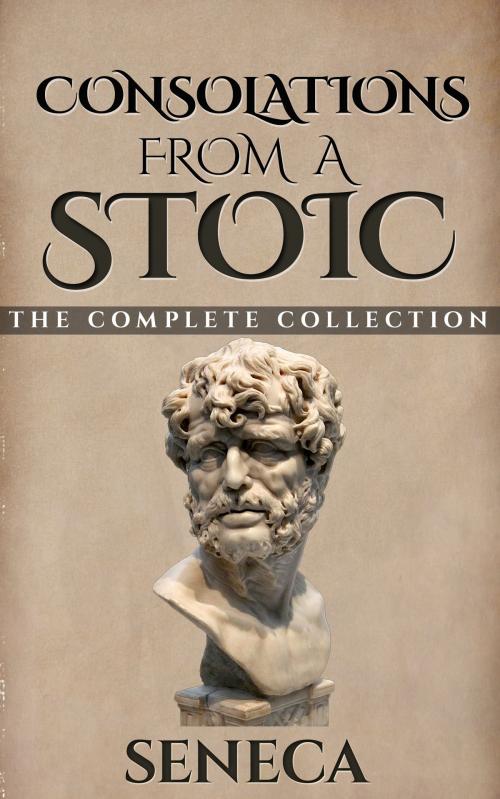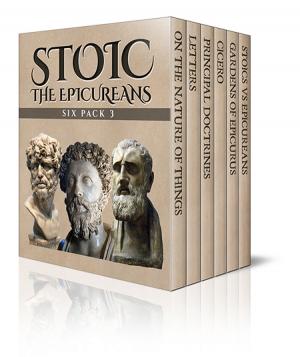Consolations From A Stoic
Nonfiction, Religion & Spirituality, Philosophy, Ancient, Ethics & Moral Philosophy, Mind & Body| Author: | Seneca | ISBN: | 1230000343305 |
| Publisher: | Enhanced E-Books | Publication: | April 6, 2015 |
| Imprint: | Language: | English |
| Author: | Seneca |
| ISBN: | 1230000343305 |
| Publisher: | Enhanced E-Books |
| Publication: | April 6, 2015 |
| Imprint: | |
| Language: | English |
“Sometimes even to live is an act of courage.”
Seneca composed the Consolations while in exile on Corsica during 40-44 AD and used each opportunity to show off in writing his trendy Stoic ideas about life and the universe. His three letters of condolences De Consolatione ad Marciam, De Consolatione ad Polybium and De Consolatione ad Helviam caused a sensation in Rome when they were circulated and before long the disgraced aristocrat was recalled from banishment and given the plum appointment of tutor to the young future emperor Nero.
In each work Seneca employs many of the rhetorical devices common to the consolatio tradition while incorporating his unique philosophy. His seemingly positive outlook on his own exile follows the Stoic principle that one should not be upset by uncontrollable events. This quote from De Consolatione ad Helviam, shows Seneca’s presentation of his life as tolerable, and even spiritually enjoyable:
I am joyous and cheerful, as if under the best of circumstances. And indeed, now they are the best, since my spirit, devoid of all other preoccupations, has room for its own activities, and either delights in easier studies or rises up eager for the truth, to the consideration of its own nature as well as that of the universe…
De Consolatione ad Polybium is the definitive representation of the part of Seneca’s life he spent in exile. He reaches out to Polybius, the Emperor’s secretary, to console him on the death of his brother. The essay focuses on the inescapable reality of death. There are more philosophical abstractions concerning Stoic precepts of life and death in De Consolatione ad Marciam. Marcia actively mourned the death of her son Metilius for over three years. Seneca attempts to convince her that that the fate of her son, while tragic, should not have been a surprise. She knew many other mothers who had lost their sons; why should she expect her own son to survive her? The acknowledgement, even expectation, of the worst of all possible outcomes is a tenet of Seneca's Stoic philosophy. While Seneca sympathized with Marcia, he reminded her that "we are born into a world of things which are all destined to die," and that if she could accept that no one is guaranteed a just life (that is, one in which sons always outlive their mothers), she could finally end her mourning and live the rest of her life in peace.
Like Letters From A Stoic (Epistulae Moralis Ad Lucilium), the Consolations are personal addresses but read more like essays than intimate letters. Both works are essential reading for students of Seneca and Stoicism in general.
*Includes image gallery and biographical essay ‘Seneca The Stoic.’
“Sometimes even to live is an act of courage.”
Seneca composed the Consolations while in exile on Corsica during 40-44 AD and used each opportunity to show off in writing his trendy Stoic ideas about life and the universe. His three letters of condolences De Consolatione ad Marciam, De Consolatione ad Polybium and De Consolatione ad Helviam caused a sensation in Rome when they were circulated and before long the disgraced aristocrat was recalled from banishment and given the plum appointment of tutor to the young future emperor Nero.
In each work Seneca employs many of the rhetorical devices common to the consolatio tradition while incorporating his unique philosophy. His seemingly positive outlook on his own exile follows the Stoic principle that one should not be upset by uncontrollable events. This quote from De Consolatione ad Helviam, shows Seneca’s presentation of his life as tolerable, and even spiritually enjoyable:
I am joyous and cheerful, as if under the best of circumstances. And indeed, now they are the best, since my spirit, devoid of all other preoccupations, has room for its own activities, and either delights in easier studies or rises up eager for the truth, to the consideration of its own nature as well as that of the universe…
De Consolatione ad Polybium is the definitive representation of the part of Seneca’s life he spent in exile. He reaches out to Polybius, the Emperor’s secretary, to console him on the death of his brother. The essay focuses on the inescapable reality of death. There are more philosophical abstractions concerning Stoic precepts of life and death in De Consolatione ad Marciam. Marcia actively mourned the death of her son Metilius for over three years. Seneca attempts to convince her that that the fate of her son, while tragic, should not have been a surprise. She knew many other mothers who had lost their sons; why should she expect her own son to survive her? The acknowledgement, even expectation, of the worst of all possible outcomes is a tenet of Seneca's Stoic philosophy. While Seneca sympathized with Marcia, he reminded her that "we are born into a world of things which are all destined to die," and that if she could accept that no one is guaranteed a just life (that is, one in which sons always outlive their mothers), she could finally end her mourning and live the rest of her life in peace.
Like Letters From A Stoic (Epistulae Moralis Ad Lucilium), the Consolations are personal addresses but read more like essays than intimate letters. Both works are essential reading for students of Seneca and Stoicism in general.
*Includes image gallery and biographical essay ‘Seneca The Stoic.’















